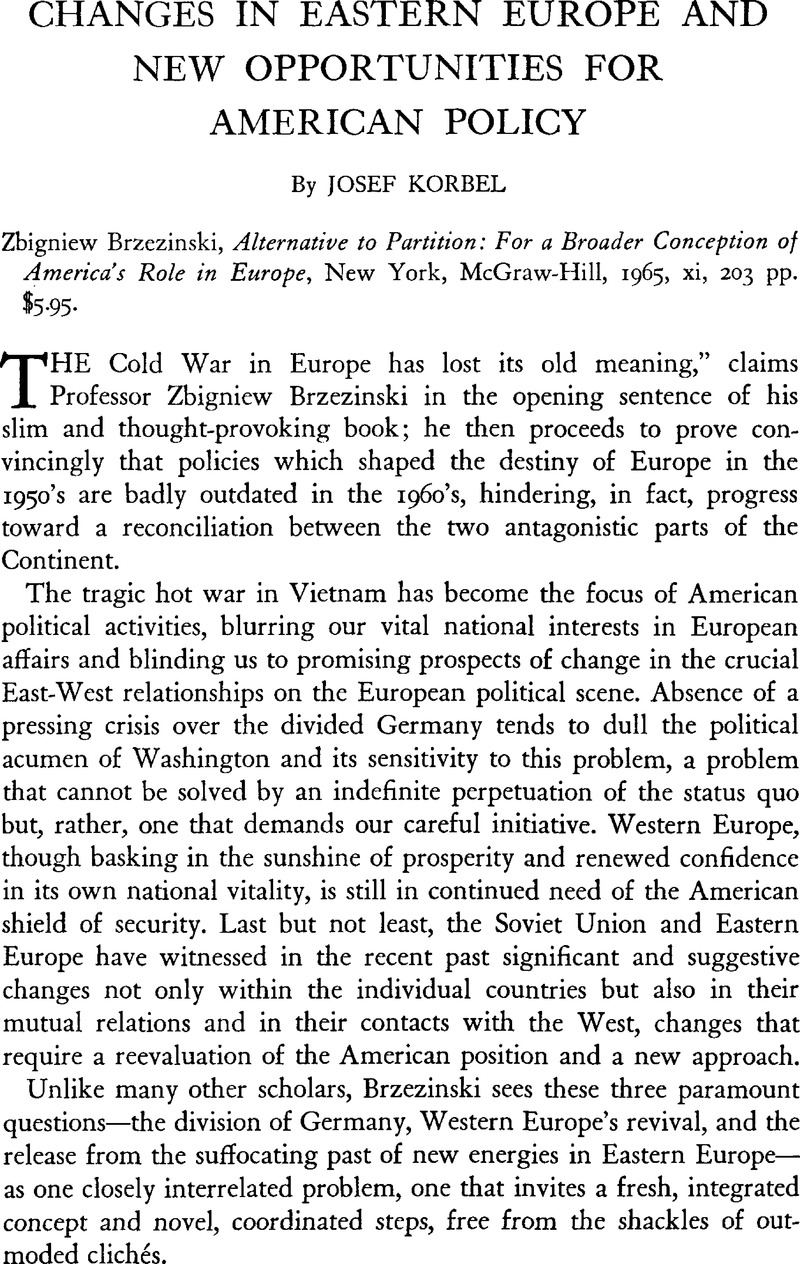No CrossRef data available.
Article contents
Changes in Eastern Europe and New Opportunities for American Policy
Published online by Cambridge University Press: 18 July 2011
Abstract

- Type
- Review Articles
- Information
- Copyright
- Copyright © Trustees of Princeton University 1966
References
1 Korbel, Josef, Tito's Communism (Denver 1951), 337.Google Scholar
2 Kennan, , On Dealing with the Communist World (New York 1964), 37–38.Google Scholar
3 Armstrong, , Tito and Goliath (New York 1951), ix, x.Google Scholar
4 Demaitre, Edmund, “In Search of Humanism,” Problems of Communism, XIV (September-October 1965), 30.Google Scholar
5 See, for instance, Schaff's, Adam book Marxism and the Individual, as reported in the New York Times, December 25, 1965.Google Scholar
6 See, for instance, Gamarinkov, Michael, “Eastern Partners for Western Businessmen,” East Europe, XIV (September 1965), 17–24.Google Scholar
7 “Germany Looks at Eastern Europe,” Foreign Affairs, XLIV (October 1965), 15–25.Google Scholar
8 Pp. 45–49.
9 Department of State Bulletin, L (March 16, 1964), 390–96.Google Scholar
10 Congressional Quarterly: Weekly Report, XXIII (May 14, 1965), 940.Google Scholar
11 Johnson-Erhard, communiqué, New York Times, December 22, 1965.Google Scholar
12 Campbell, , American Policy Toward Communist Eastern Europe: The Choices Ahead (Minneapolis 1965), 106Google Scholar; Acheson, , “Europe: Decision or Drift,” Foreign Affairs, XLIV (January 1966), 205.Google Scholar
13 P. 32.
14 Rothschild, Joseph identifies himself with this policy of “awards.” See his Communist Eastern Europe (New York 1964), 90.Google Scholar
15 P. 48.
16 P. 20.
17 Der Spiegel, XX (January 17, 1966), 22–28.Google ScholarLowenthal, Richard reflects a similar opinion in “The Germans Feel Like Germans Again,” New York Times Magazine, March 6, 1966, 44.Google Scholar
18 New York Times, March 26, 1966.
19 President Johnson's statement, May 7, 1965, in Congressional Quarterly, 940.
20 Johnson-Erhard communiqué. As Lowenthal says, “The mere occasional repetition of ritual declarations in favor of [reunification] is not enough” (p. 47).
21 The Troubled Partnership (New York 1965), 189.Google Scholar
22 Ibid., 206, 209.
23 Ibid., 208.
24 P. 106.
25 P. 212.
26 In Wolfers, Arnold, ed., Changing East-West Relations and the Unity of the West (Baltimore 1964), 118.Google Scholar




